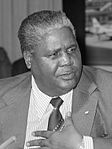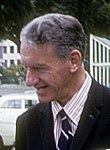Zimbabwean parliamentary election, 1985
|
|
|||||||||||||||||||||||||||||||||||||||||||||||||||
|
|||||||||||||||||||||||||||||||||||||||||||||||||||
|
|||||||||||||||||||||||||||||||||||||||||||||||||||
|
|||||||||||||||||||||||||||||||||||||||||||||||||||
The Zimbabwe parliamentary election of 1985 saw the re-election, with an increased majority, of the Zimbabwe African National Union - Patriotic Front government under Robert Mugabe which had first been elected five years previously prior to the country achieving independence. It was thus the first time a general election in Zimbabwe had been conducted under the administration of that country's authorities.
The previous election had shown that ZANU (PF) had monopolised popular support among the Shona areas, and the chances of it losing the election were minimal. However, ZANU (PF) needed to affirm its support and demonstrate that it retained the confidence of the people that it was making genuine progress. Popular support for PF-ZAPU, outside the Ndebele areas, was minimal, and the United African National Council of Abel Muzorewa had lost support to ZANU (PF) following the effective transition into government of Robert Mugabe.
The white MPs in the previous Assembly, who had all started off as members of the Rhodesian Front (later renamed the Republican Front), had split over their reaction to the ZANU (PF) government with more than half resigning their membership in March 1982 to become Independents who partially supported ZANU (PF). Eventually, in April 1985, the Independent Zimbabwe Group was formed in preparation for the election. Generally, whites in Harare and Bulawayo had little complaint about the conduct of government, having seen little change in their lifestyles.
...
Wikipedia



